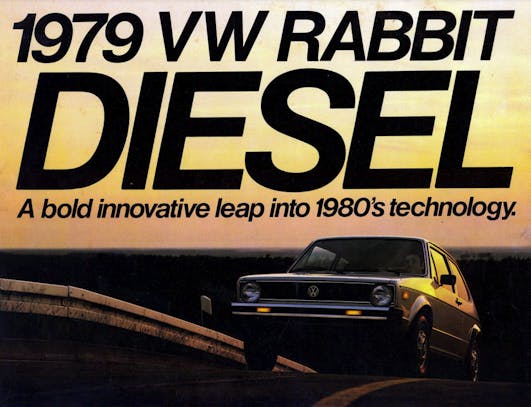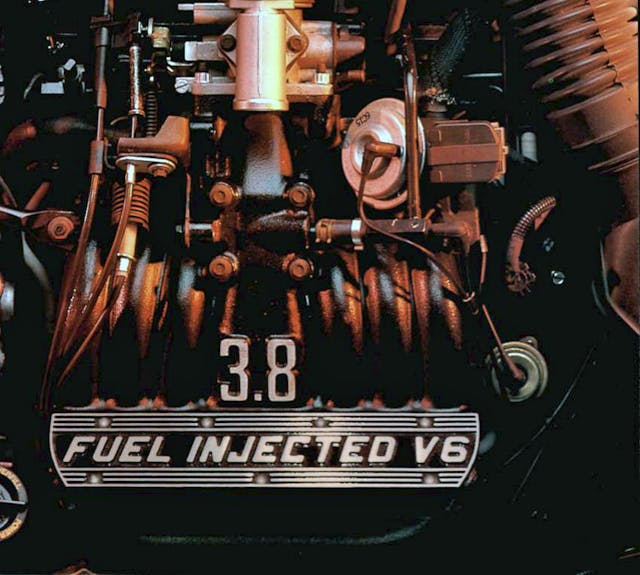What’s the worst engine you’ve experienced?
We’ve seen the good and the bad in our lives, haven’t we? And when it comes to our passion for the automobile, does anything get us more upset than a poorly performing engine?
Take the photo above, as I am (sadly) quite the fan of Ford’s fairly disappointing Essex V-6. I am painfully aware of the issues with its head-gasket-munching demeanor, but I remain firm in my convoluted logic to find appeal in this mill. Which is irrelevant when the aluminum heads and flawed gasket design take over … but what was the motor that I truly hated?

I was but a young child in the back seat of this poor little VW product. Thanks to its diesel engine, the memories of my family’s temporary ownership of the VW Rabbit linger to this day. (A family friend wanted us to run it periodically while he was tending to family matters in India over the holidays.) I was freezing cold in a damp parking garage, realizing that perhaps a 3-to-4-year-old VW diesel wasn’t as cool as I was expecting it would be. The engine refused to fire up with my Dad behind the wheel for several minutes—an eternity, for a kid my age.
The owner had told us his Rabbit was finicky, but the frustration in my father’s eyes was hard to forget. He had some choice words for the Rabbit, words that kids aren’t supposed to hear. Oh, to be a fly on the wall when my father made a long-distance call to India about that particular VW product.
The diesel Rabbit sputtered and stalled when it was cold, behavior which was kinda terrifying with all the bigger vehicles here on the mean streets of Houston, Texas. Things fared better when it warmed up, but the engine’s 50-ish horsepower meant merging on any of the interstates was an act best reserved for the most faithful of the flock.
This was the first time I remember my clothes smelling like the fumes emanating from a tailpipe, for better or worse. To this day I wonder how long the glow plugs are supposed to last on these engines, and if this particular Rabbit needed a new set.
No matter, this question remains:
What’s the worst engine you’ve experienced?
Check out the Hagerty Media homepage so you don’t miss a single story, or better yet, bookmark it.



I recently got involved with a 1992 Toyota V6 rebuild. The truck had a blown head gasket, the oil was full of water. Obviously these vehicles have a huge cult following of being amazingly reliable which I’m sure is well deserved. HOWEVER when things do start to go it will cost you and assembly must be performed like a surgical operation. Parts and pieces and shrouds, crossover exhaust converters not to mention miles of vacuum lines weird little filters and of course the timing belt alignment are all part of the problem, not to mention the famous under the manifold sensor wire.
Ordinarily working on engines can be kind of fun be it a small block or an English roadster, although you have to make little tweaks often and pay attention to detail the reward of a few hours attention is measurable performance improvement.
I’ve got you all beat. 1679cc flat 4 in my parents 1972 VW411 wagon with a wimpy 3-speed auto transmission. 2 fires caused by improper fuel injection repair at the so-called dealer in Florida. The 2nd fire caused near total immolation. Plus it was slower than a Pinto or Vega.
2015 Ford EcoBoost 1.5L – absolute garbage compared to every other engine I’ve had the pleasure (or displeasure) of operating. The entire long block was replaced at 60,000 miles. The reality is that you can’t have it all and ultimately lose out due to the extra complexity and stresses on the engine. I am not sure if the other EcoBoost variants are like this and I don’t care to find out personally.
Worst engine? The 2 litre engine in my 2011 Chevy Cruze. At 60k it needed to be replaced due to “low compression” in cylinder #2. Done under warranty. One year later (just after the warranty expired) the engine light came on and it was diagnosed as “low compression in cyl #2”. The cure… a new engine. I wasn’t wasting my money on it. I really liked the car… it was the engine that was shit.
The 4.6l V8 in my 2004 Ford F150 is by far the worst engine I have ever experienced. This pickup did not have the power to pull even a moderate grade at highway speed without downshifting. This engine self-destructed with less than 80,000 miles by ingesting parts of its own spark plugs. The odd thing was that it had just as much power as a 7-cyl. engine as an 8.
Yes, I had the Quad 4 in a Pontiac Grand Am. Delightful, until the head gasket failed. Dealership near my work (different state from purchase point) tried really hard not to cover the failure but, after showing how much coolant I was adding, did a cheap fix. Probably tore it down to only replace the head gasket because it failed again, just out of warranty. At that point, I was back where I bought the car, and they repaired it again, but it still didn’t seal. Any time I got in traffic, it would overheat and blow out the coolant. Tried checking the cooling system (radiator, etc.) without finding any issues. Aluminum head must have been significantly warped by that point. Finally sold that car. Too bad as it was fine as long as it was moving.
Also had a Citation with the 2.8 liter V6, but never had engine issues. Did have class action suit for the power brakes (required with V6 and manual transmission) and at least a couple recalls plus some extended warranties. Car was a complete dog, and why I bought another GM product (the Grand Am) is silly. Will NOT buy another GM product as a result of those two vehicles!
Worst engine was my Datsun 710 L16 *AFTER* I modified it with Offy manifold, Pinto carb, removed smog stuff, GM alternator. Should have left it mostly stock. Sold it and lost $800 or so.
1987 Jeep YJ 4.2l straight six. It had a carburetor with a “stepper motor” I think it was called that I never did figure what it did, 6200 vacuum lines and the most unpredictable running behaviors with no rhyme or reason. One day you could barely accelerate or keep it running at idle and the next day or even next time you started it, the thing would purr like a kitten and accelerate respectfully. Same weather, same fuel,same driver it was unbelievably unpredictable. It definitely kept things interesting.
I agree with the author. We bought new a 1984 VW Rabbit diesel, easily the slowest car I’ve ever owned. A hill of any consequence required turning off the air conditioning, downshifting and probably downshifting again. Passed it on to our oldest when she turned 16 who drove it for years after college. The first DieselGate?
As a retired professional technician I have a list of engineering shortcomings. Let’s start with a couple of the worst. The Cadillac V8-6-4 and the Cadillac 4.1. The V8-6-4 was a great concept at a time where the technology was unable to support it. Even the Cadillac dealer would take advantage of the first opportunity they got to disconnect it. The 4.1 had 2 ft long head bolts that were used as structural elements for the engine block. Brilliance! The Iron Duke would break the #5 head bolt. I had a cottage industry going to fix those. The Ford 3.8 has been discussed deservedly and at length for its head gasket issues. The Jeep 4.0 had similar head gasket issues. The Chrysler 3.5 mainly because any type of service was guaranteed to be an undertaking of epic measure. Most of these engines came at a time where the manufacturers were desparately trying to up date their technology to keep up with CAFE and emission standards. There are modern engines that are worse than others but I don’t see the degree of questionable engineering that we experienced from the late 70’s through the middle 90’s.
85 Olds Cutlass with 3.8L V-6. Ran good, although anemic performance. Always had oil in the air cleaner. Dealer was convinced it was a pvc problem and couldn’t be anything major since it was a brand new car. I finally convinced them to tear it down. Called me up and told me they were installing a new engine under warranty — they discovered the original engine had a cracked block in the lifter valley. If I hadn’t insisted they tear it down, who knows how long it woiuld have lasted. Never had a problem with the replacement engine, though.
My first brand-new car was a 1977 Honda Civic CVCC. Within 60K miles it had eaten 3 water pumps and blown it’s head gasket. The head gasket had been recalled but would not be replaced until blown. It really blew up nicely and the engine never ran right again.
Easy! The 4 cylinder turbocharged engine in my Mustang SVO. Purchased new, the thing was a harsh, coarse sounding vibrator. The turbo failed at around 2000 miles, followed by problems with boost regulation, waste gate and then the gearbox, which failed the 3rd gear synchronizer (a GM engineer told me when I bought the car that 3rd gear was a problem with the Ford specific T5s back then) while still in warranty. The car wasn’t driven hard, and we had use of it for about 9 months during the first year that we owned the car. Parts were hard to come by, even from the major huge Ford dealer in our area. We finally traded it for a new Supra, which didn’t handle as well, but had a very smooth 24 valve DOHC I-6. It was also built much better as well. No problems after that.
1970 Chevy Vega with the Aluminum block 2.3L four cylinder. I still recall in addition to the engine failures, the Vega had the prestige of being known as “the first American car that started rusting while on the showroom floor”.
Bought a 2000 S10 pickup with the 2.2 four banger. Equipped with an automatic, the truck would not keep up with traffic. On much of an uphill run, it was always a it doubtful whether you would make the crest. Chevy claimed it was 120hp, but those horses must have been a few steps from the glue factory.